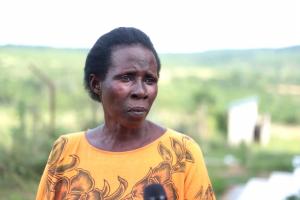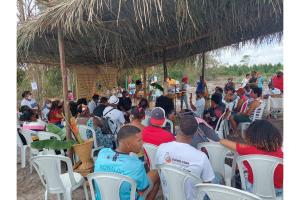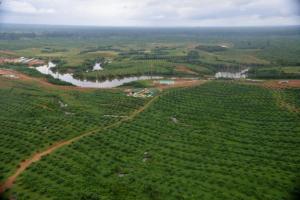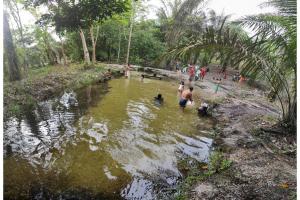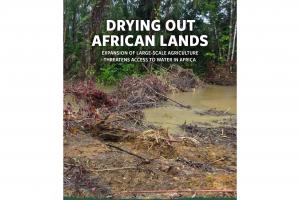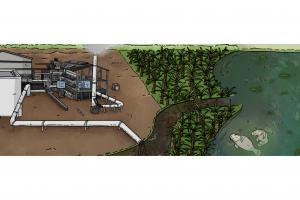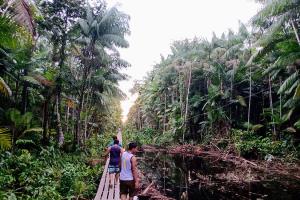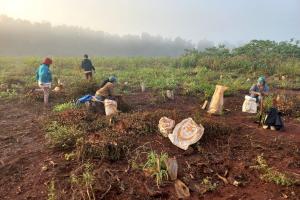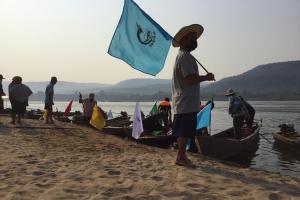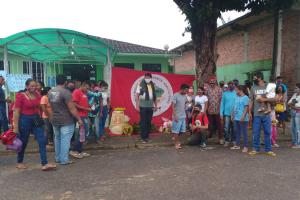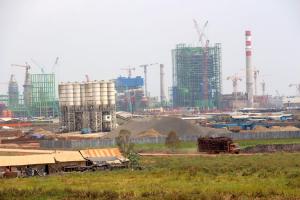The Informal Alliance Against the Expansion of Industrial Oil Palm Plantations in West and Central Africa released a declaration to keep breaking the silence of the many abuses around industrial plantations and to reaffirm their strong commitment to resist their expansion in the defence of their territories and lives.
Large-Scale Tree Plantations
Industrial tree plantations are large-scale, intensively managed, even-aged monocultures, involving vast areas of fertile land under the control of plantation companies. Management of plantations involves the use of huge amounts of water as well as agrochemicals—which harm humans, and plants and animals in the plantations and surrounding areas.
Bulletin articles
11 October 2022
Multimedia
14 September 2022
In the Buvuma Islands, in Uganda, communities are resisting the expansion of industrial oil palm plantations.
Bulletin articles
12 September 2022
The quilombola communities of Sapê do Norte, Brazil, are living a violent process with the expansion of large-scale eucalyptus monoculture. After many hardships, they started a process to take back their water and land. And the struggle to take back what is theirs continues. WRM talked to two quilombola activists to reflect on this difficult but fertile process of resistance.
Bulletin articles
12 September 2022
Industrial palm oil production in West and Central Africa is mainly controlled by five multinational corporations, and could continue expansion. Plantations take up large tracts of land. Land and water are interdependent. Yet, the current water crisis in these territories would not exist if corporations had not grabbed the land from communities.
Bulletin articles
12 September 2022
There is no other crop that has grown faster globally in the last decade than palm oil. This almost uncontrollable expansion leaves a deep trail of destruction and conflicts around its giant areas of plantations from Southeast Asia to West and Central Africa. As companies take over more community land, they also grab the water sources from them.
Other information
12 September 2022
A recent publication from the organization The Oakland Institute reviews 15 projects from agribusiness in 11 African countries, evidencing how the large loss of land has entailed a dramatic impact on communities’ access to water.
Other information
12 September 2022
An article in the news portal Mongabay exposes how six years after complaints were filed against the company Oro Rojo for polluting the rivers, wetlands and air, with its palm oil mill, nothing has changed.
Bulletin articles
16 June 2022
Fossil fuels are at the root of the climate chaos – but the conditions for this crisis have been created by the interconnections and dependencies between colonialism, racism, patriarchy and class exploitation. To address climate chaos, therefore, it is necessary to address the unequal relationships of power upon which a fossil-fuel dependent capitalism is based.
Bulletin articles
16 June 2022
The Independent Producers of Piray (PIP) in Misiones, Argentina was formed in 2005 to stop the advance of multinational Arauco’s pine tree monocultures and reclaim the land. WRM spoke with Miriam Samudio, a key member of the PIP family, to reflect on the process of the struggle and the lessons learned.
Bulletin articles
16 June 2022
The nearly 5,000 km. of the Mekong River, which crosses six countries and sustains the lives and livelihoods of millions, is under severe threat due to the on-going construction of large scale dams. Communities are resisting what could be the final struggle to save some of the remaining parts of the River… of their lives.
Bulletin articles
16 June 2022
In Brazil, oil palm plantations are expanding rapidly, mainly in the Amazonian state of Pará. BBF (Brasil BioFuels), the largest oil palm company in Brazil, stands accused of environmental crimes and violence against indigenous, quilombola and peasant communities such as Virgílio Serrão Sacramento, a community linked to the Small Farmers’ Movement (MPA).
Bulletin articles
16 June 2022
More than 10 million hectares in Indonesia are controlled by the pulp and paper industry, mainly by two giant corporations: APP and APRIL. Despite the companies’ commitments to protect forests and peatland, both keep being associated with deforestation, forest fires and to a business model of violence, criminalization and dispossession of forest communities. (Available in Bahasa Indonesia)

